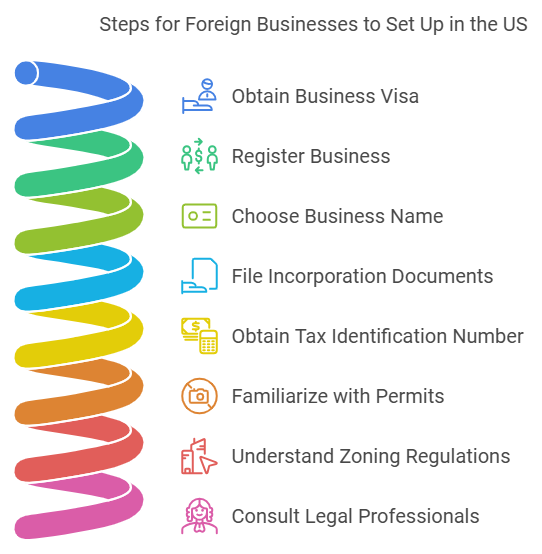 Setting up a business in the US offers exciting opportunities but requires careful preparation. The process involves navigating legal, financial, and operational steps. Understanding local regulations, tax requirements, and market expectations can make the process smoother. Additionally, choosing the right business structure ensures you meet both your goals and compliance standards.
Setting up a business in the US offers exciting opportunities but requires careful preparation. The process involves navigating legal, financial, and operational steps. Understanding local regulations, tax requirements, and market expectations can make the process smoother. Additionally, choosing the right business structure ensures you meet both your goals and compliance standards.
Adapting to the U.S. market is equally important for success. Conducting market research and tailoring your approach to customer preferences builds trust and engagement. Establishing relationships with local partners or suppliers also helps streamline your operations. These efforts lay the groundwork for growth and long-term sustainability.
With the right strategies, you can successfully enter and compete in this dynamic market. Establishing an American location requires focus and adaptability, but it also offers significant potential for expansion and growth. By addressing each step carefully, you position your business to thrive in this competitive environment.
Understanding U.S. Business Structures
Understanding U.S. business structures is a key step in setting up a business in the US. The structure you choose affects your taxes, liability, and day-to-day operations. Common options include Limited Liability Companies (LLCs), corporations, and partnerships. Each has unique features that may fit different business needs.
LLCs are popular due to their flexibility and limited liability protection. They combine elements of corporations and partnerships, making them a versatile choice. Corporations, such as C-corporations or S-corporations, are more structured and suitable for businesses seeking investment or planning to go public. Partnerships allow two or more people to share ownership, making them simpler but with shared liabilities.
When selecting a structure, consider factors like the size of your business, its goals, and the level of legal protection you need. Consulting with legal or financial professionals can help you make an informed decision. Choosing the right structure is essential for successfully establishing a U.S. presence and achieving your long-term objectives.
Navigating Legal and Regulatory Requirements
Navigating legal and regulatory requirements is a critical step in setting up a business in the US. Foreign businesses must comply with federal, state, and local regulations to operate legally. Understanding these requirements helps you avoid potential setbacks and ensures a smooth start.
Obtaining the appropriate visa is often the first step if you plan to operate or manage your business in the US. Business visas, such as the E-2 or L-1, allow foreign nationals to invest in or expand a business. After securing the visa, you must register your business with the appropriate state authorities. Registration typically includes choosing a business name, filing incorporation documents, and obtaining a tax identification number.
You also need to familiarize yourself with industry-specific permits and local zoning regulations. Federal laws may govern areas like import/export, while state or local rules might address licensing and compliance. Consulting legal professionals with experience in US business law can simplify the process. These steps are essential for successfully setting up a business in the US and maintaining compliance with all applicable laws.
Securing a U.S. Business Address and Bank Account
Securing a U.S. business address and bank account is an essential step when setting up a business in the US. A physical address lends credibility to your business and is often required for registrations and contracts. It also helps establish trust with customers, vendors, and partners, making your presence more tangible and reliable.
A U.S. bank account simplifies financial operations and helps you manage payments, payroll, and transactions efficiently. Many vendors and clients prefer to work with businesses that have local banking relationships. Additionally, having a U.S. bank account can reduce international transaction fees and streamline currency exchanges, saving you time and money.
Establishing a business address and bank account also supports compliance with legal and tax requirements. Many states and financial institutions require a U.S. address to verify your business registration. By taking these steps, you set a strong foundation for your operations while building trust and credibility in the U.S. market. These actions are critical to successfully setting up a business in the US and ensuring smooth daily operations.
Obtaining the Necessary Permits and Licenses
Obtaining the necessary permits and licenses is a key part of setting up a business in the US. The requirements vary depending on your industry, location, and business type. Federal, state, and local regulations often determine the permits and licenses you need to operate legally.
At the federal level, certain industries like agriculture, transportation, and healthcare may require specialized licenses. Additionally, state governments often have their own rules, especially for businesses that handle food, alcohol, or professional services. Local permits may also apply, such as zoning approvals or health inspections, which are crucial for ensuring compliance.
To streamline the process, research the specific requirements for your industry and location before applying. Using government resources or consulting legal professionals can help you identify all necessary documentation. By addressing these legal requirements early, you reduce the risk of penalties and ensure your business operates smoothly. These steps are vital for successfully setting up a business in the US and staying compliant with all regulations.
Understanding U.S. Tax Obligations
Understanding U.S. tax obligations is an essential step when setting up a business in the US. Taxes are assessed at the federal, state, and local levels. Each level may have unique requirements depending on your business type and location.
Federal taxes include income taxes, payroll taxes, and, in some cases, excise taxes. The Internal Revenue Service (IRS) oversees these, and you must obtain an Employer Identification Number (EIN) to comply. State taxes vary widely, with some states imposing income tax and others focusing on sales or franchise taxes. Additionally, local governments may require property taxes or specific fees tied to your business operations.
To maintain compliance, track filing deadlines and keep detailed records of all transactions. Many businesses benefit from working with tax professionals who specialize in U.S. regulations. Avoiding common pitfalls like underpayment or late filing protects your business from penalties. By understanding these obligations, you simplify the process of setting up a business in the US while ensuring long-term compliance.
Adapting to the U.S. Market and Culture
Adapting to the U.S. market and culture is a critical step when expanding into the U.S. Understanding consumer behavior helps you align your offerings with market expectations. Conducting thorough market research provides insights into preferences, buying habits, and regional trends.
Cultural nuances also play a significant role in shaping your strategy. For example, U.S. consumers often value convenience, personalization, and transparency. Tailoring your product or service to meet these expectations can improve customer engagement. Additionally, recognizing regional differences within the U.S. allows you to adapt your approach to specific audiences.
Aligning your business practices with U.S. standards is equally important. Building strong relationships with partners and suppliers often requires clear communication and efficient processes. Incorporating feedback from customers helps refine your offerings and build loyalty. By focusing on these strategies, you create a foundation for success when setting up a business in the US and expanding your presence in this competitive market.
Conclusion
Setting up a business in the US requires careful planning, research, and adaptability. Understanding legal, financial, and cultural factors helps you build a strong foundation. By addressing regulations, securing necessary permits, and aligning with U.S. business practices, you streamline the process and minimize challenges.
Adapting to the U.S. market involves more than compliance. Learning consumer behaviors and tailoring your products or services ensures you meet customer expectations. Additionally, building local relationships and leveraging resources strengthens your position in the market. Each step plays a role in establishing trust and credibility.
With thorough preparation, you set your business up for long-term success. Whether navigating taxes, market trends, or operational requirements, staying proactive is essential. Establishing a U.S. presence offers significant opportunities, and with the right approach, you can achieve your goals and grow sustainably.



